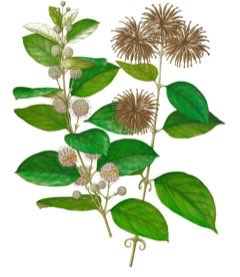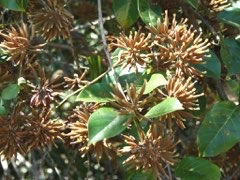 |
|
http://www.edibleplants.org |
 |
| Vojtech Zavadil wikimedia.org |
Translate this page:
Summary
Cat's Claw, Uncaria guianensis, is an evergreen climbing shrub that can be found in South America. It is used in traditional medicine as a treatment for a wide range of diseases and conditions such as inflammations, rheumatism, arthritis, urinary tract infections, gastric ulcers, asthma, wounds, menstrual irregularities, cancer, fevers, haemorrhage, weakness, mouth ulcers, tuberculosis, coughs, colds, etc. The stems produce a potable sap. Wood is used in furniture making.
Physical Characteristics

 Uncaria is an evergreen Climber growing to 30 m (98ft) by 0.5 m (1ft 8in) at a fast rate.
Uncaria is an evergreen Climber growing to 30 m (98ft) by 0.5 m (1ft 8in) at a fast rate.
See above for USDA hardiness. It is hardy to UK zone 10.
Suitable for: light (sandy) and medium (loamy) soils and prefers well-drained soil. Suitable pH: mildly acid and neutral soils and can grow in very acid soils.
It cannot grow in the shade. It prefers moist soil.
UK Hardiness Map
US Hardiness Map
Synonyms
Nauclea aculeata (Willd.) Willd. Nauclea guianensis (Aubl.) Poir. Ourouparia guianensis Aubl. Uncari
Plant Habitats
Edible Uses
The stems are a source of a potable sap that is used to quench thirst and as a restorative drink[646 ]. A watery, astringent taste[646 ].
References More on Edible Uses
Medicinal Uses
Plants For A Future can not take any responsibility for any adverse effects from the use of plants. Always seek advice from a professional before using a plant medicinally.
Cat's claw has a long history of traditional use, being employed in the treatment of a range of conditions including inflammations (especially rheumatism), arthritis, urinary tract infections and gastric ulcers. It has also been used as a blood purifier; to cleanse the kidneys; to recover from childbirth or treat menstrual irregularities; as a treatment for asthma Applied externally, it is used as a wash for wounds in order to promote healing, to cleanse the skin of impurities etc[646 ]. The plant is widely used in modern herbal medicine, where it is primarily valued for its stimulatory effect upon the immune system[646 ]. The part most commonly used is the stem bark[646 ]. Cat's claw has many modern applications, which is a common trait of herbs with immune stimulatory activity, and includes: disease prevention, cancer, recovery from chemotherapy side effects, recovery from childbirth, urinary tract infections, wounds, fevers, haemorrhages, and weakness. Applications for cat's claw which have had some clinical research include viral infections, pain and symptoms of Herpes infections, and for inflammatory conditions, such as Rheumatoid arthritis[646 ]. Research has shown that the plant is anti-inflammatory, immune system stimulant, cytoprotective and antioxidant[646 ]. The plant is astringent[348 ]. An infusion of the whole plant is drunk to remedy dysentery. The plant is burned and powdered, then used on wounds. It is made into a gargle to remedy mouth ulcers[348 ]. The leaves are used in the treatment of tuberculosis, coughs and colds[348 ]. The plant contains tannins[348 ].
References More on Medicinal Uses
The Bookshop: Edible Plant Books
Our Latest books on Perennial Plants For Food Forests and Permaculture Gardens in paperback or digital formats.

Edible Tropical Plants
Food Forest Plants for Hotter Conditions: 250+ Plants For Tropical Food Forests & Permaculture Gardens.
More

Edible Temperate Plants
Plants for Your Food Forest: 500 Plants for Temperate Food Forests & Permaculture Gardens.
More

More Books
PFAF have eight books available in paperback and digital formats. Browse the shop for more information.
Shop Now
Other Uses
Other Uses: The wood is a pale pinkish-brown; straight-grained; coarse-textured; light in weight[453 ]. The stems are used in making furniture[646 ].
Special Uses
References More on Other Uses
Cultivation details
A plant of mainly low elevations in the tropics, where it can be found at elevations up to 1,000 metres. Succeeds in fairly sunny positions, as on forest edges[646 ]. Prefers a pH in the range 4.4 - 6.2[646 ]. The stems are only large enough to harvest when they are 8 years or elder. Generally, it is recommended that the vine is cut at 20 - 100cm above the ground and left to regenerate[646 ].
References Carbon Farming Information and Carbon Sequestration Information
Temperature Converter
Type a value in the Celsius field to convert the value to Fahrenheit:
Fahrenheit:
The PFAF Bookshop
Plants For A Future have a number of books available in paperback and digital form. Book titles include Edible Plants, Edible Perennials, Edible Trees,Edible Shrubs, Woodland Gardening, and Temperate Food Forest Plants. Our new book is Food Forest Plants For Hotter Conditions (Tropical and Sub-Tropical).
Shop Now
Plant Propagation
Seed - it has a very short viability and needs to be sown as soon as it is ripe[646 ]. Stem cuttings about 20cm long[646 ]. If the soil of the forest is moist enough, the cuttings are said to be easy to reproduce by directly inserting them into the forest floor. If the conditions are right, the roots develop soon after transplanting[646 ].
Other Names
If available other names are mentioned here
cat's-claw, uña de gato, uña de gato blanca.
Native Plant Search
Search over 900 plants ideal for food forests and permaculture gardens. Filter to search native plants to your area. The plants selected are the plants in our book 'Plants For Your Food Forest: 500 Plants for Temperate Food Forests and Permaculture Gardens, as well as plants chosen for our forthcoming related books for Tropical/Hot Wet Climates and Mediterranean/Hot Dry Climates. Native Plant Search
Found In
Countries where the plant has been found are listed here if the information is available
Weed Potential
Right plant wrong place. We are currently updating this section.
Please note that a plant may be invasive in one area but may not in your area so it’s worth checking.
Conservation Status
IUCN Red List of Threatened Plants Status : This taxon has not yet been assessed

Growth: S = slow M = medium F = fast. Soil: L = light (sandy) M = medium H = heavy (clay). pH: A = acid N = neutral B = basic (alkaline). Shade: F = full shade S = semi-shade N = no shade. Moisture: D = dry M = Moist We = wet Wa = water.

Expert comment
Author
(Aubl.) J.F.Gmel.
Botanical References
Links / References
For a list of references used on this page please go here
A special thanks to Ken Fern for some of the information used on this page.
Readers comment
| Add a comment |
|
If you have important information about this plant that may help other users please add a comment or link below. Only comments or links that are felt to be directly relevant to a plant will be included. If you think a comment/link or information contained on this page is inaccurate or misleading we would welcome your feedback at [email protected]. If you have questions about a plant please use the Forum on this website as we do not have the resources to answer questions ourselves.
* Please note: the comments by website users are not necessarily those held by PFAF and may give misleading or inaccurate information.
To leave a comment please Register or login here All comments need to be approved so will not appear immediately.
|
|